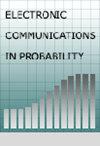普通树木上的有线树上气体
IF 0.5
4区 数学
Q4 STATISTICS & PROBABILITY
引用次数: 4
摘要
我们研究了具有有线边界条件的正则树沿任何衰竭的树栖气体的弱极限。我们证明了这个极限是存在的,不取决于衰竭的选择,并且经历了一个相变。在临界以下,我们证明了该模型等价于键渗流。在临界以上,我们将模型描述为临界键渗流和有限单端路径的随机集合的叠加。这提供了一个树状气体模型的简单例子,该模型在其超临界阶段继续表现出类似临界的行为。本文章由计算机程序翻译,如有差异,请以英文原文为准。
The wired arboreal gas on regular trees
We study the weak limit of the arboreal gas along any exhaustion of a regular tree with wired boundary conditions. We prove that this limit exists, does not depend on the choice of exhaustion, and undergoes a phase transition. Below and at criticality, we prove the model is equivalent to bond percolation. Above criticality, we characterise the model as the superposition of critical bond percolation and a random collection of infinite one-ended paths. This provides a simple example of an arboreal gas model that continues to exhibit critical-like behaviour throughout its supercritical phase.
求助全文
通过发布文献求助,成功后即可免费获取论文全文。
去求助
来源期刊

Electronic Communications in Probability
工程技术-统计学与概率论
CiteScore
1.00
自引率
0.00%
发文量
38
审稿时长
6-12 weeks
期刊介绍:
The Electronic Communications in Probability (ECP) publishes short research articles in probability theory. Its sister journal, the Electronic Journal of Probability (EJP), publishes full-length articles in probability theory. Short papers, those less than 12 pages, should be submitted to ECP first. EJP and ECP share the same editorial board, but with different Editors in Chief.
 求助内容:
求助内容: 应助结果提醒方式:
应助结果提醒方式:


